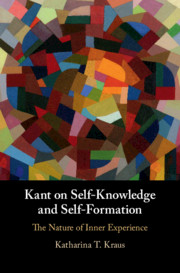Book contents
- Kant on Self-Knowledge and Self-Formation
- Kant on Self-Knowledge and Self-Formation
- Copyright page
- Dedication
- Epigraph
- Contents
- Figures
- Table
- Preface
- Introduction From Inner Experience to the Self-Formation of Psychological Persons
- Part I The Appearing Self
- 1 Inner Sense as the Faculty for Inner Receptivity
- 2 Temporal Consciousness and Inner Perception
- Part II Self-Consciousness and the “I” of the Understanding
- Part III The Human Person and the Demands of Reason
- Bibliography
- Index
2 - Temporal Consciousness and Inner Perception
from Part I - The Appearing Self
Published online by Cambridge University Press: 01 December 2020
- Kant on Self-Knowledge and Self-Formation
- Kant on Self-Knowledge and Self-Formation
- Copyright page
- Dedication
- Epigraph
- Contents
- Figures
- Table
- Preface
- Introduction From Inner Experience to the Self-Formation of Psychological Persons
- Part I The Appearing Self
- 1 Inner Sense as the Faculty for Inner Receptivity
- 2 Temporal Consciousness and Inner Perception
- Part II Self-Consciousness and the “I” of the Understanding
- Part III The Human Person and the Demands of Reason
- Bibliography
- Index
Summary
Chapter 2, “Temporal Consciousness and Inner Perception”, offers an interpretation of inner perception as the perception of distinctively inner appearances by drawing on resources from the Transcendental Aesthetic and the Transcendental Analytic (mainly the A-Deduction) of the first Critique. The chapter develops an interactional model of perception with three constitutive aspects: (1) affection through outer sense, (2) synthesis of apprehension through the active faculties of the mind, viz. imagination and understanding, and (3) self-affection through inner sense. Each of these constitutive aspects is shown to define a formal and a material condition of perception. By carving out the notion of transcendental self-affection, i.e., the a priori determination of the form of inner sense through the understanding, the chapter derives the a priori temporal conditions of perception. Applying the general model to the inner case, inner perception is construed as empirical consciousness of inner appearances, based on empirical self-affection.
Keywords
- Type
- Chapter
- Information
- Kant on Self-Knowledge and Self-FormationThe Nature of Inner Experience, pp. 43 - 80Publisher: Cambridge University PressPrint publication year: 2020

